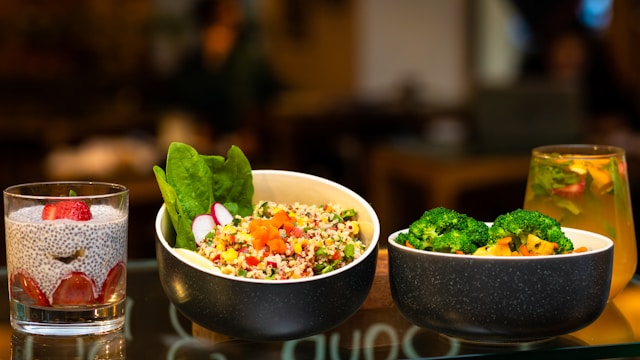You don’t need to buy a gym membership or hire a fitness coach to move your body. One of the simplest ways to help your health is to walk for 30 minutes every day. This small habit lowers stress and helps your body use less cortisol, the hormone linked to anxiety and belly fat.
If you walk outside, there’s even more benefit. Studies show that being in nature can help improve your mood, make you feel more relaxed, and even boost your memory. The fresh air, sunshine, and greenery all help your body feel calm and focused. Walking is also gentle on your joints, so it works well even if you’re just starting out.
Just like taking breaks from screens or gambling not on Gamstop, giving your body daily movement keeps your mind clear and balanced. All you need is a pair of comfortable shoes and a little bit of time. Try walking in the morning or after dinner—it’s easy, free, and effective.
Swap One Junk Food for One Healthy Food Every Week
Changing your whole diet overnight can be hard. But what if you started by changing just one thing? One of the easiest ways to improve your meals is by replacing one junk food each week with a healthy option. You don’t need a personal nutritionist to tell you that chips or sugary drinks don’t help your health.
Instead, try switching one item for something better—like a handful of nuts instead of candy, or steamed vegetables instead of fried snacks. Fresh fruits, leafy greens, seeds, sprouts, and healthy oils are all simple options that support your body and give you real energy.
If you did this once a week for a year, you would replace 52 unhealthy foods with better choices. That adds up quickly and creates a diet you can feel proud of—without feeling overwhelmed.
Let Food Help You Feel Happier Every Day
We often think about food in terms of weight or looks. But food also plays a big role in how we feel. Certain foods help your brain release “happy chemicals” like dopamine, serotonin, and oxytocin. These chemicals improve your mood and support your mental health.
You don’t have to make huge changes to get this effect. Eating dark chocolate in moderation, laughing more often, and taking probiotics can all help. Probiotics improve your gut health, and the gut is closely connected to the brain. That means when your digestion feels better, your mood can improve too.
The good news is that small choices like these can lift your mood without needing pills or expensive treatments. It’s worth paying attention to what makes you feel good—not just full.
Don’t Let Stress Run Your Day
Many people make changes to their diet when they want to look better, but stress is something that affects how you feel on the inside. And often, it’s easy to ignore until it becomes too much. That’s why learning how to manage stress is one of the best things you can do for your health.
Stress affects your sleep, your immune system, and even your digestion. But there are simple ways to lower it. Deep breathing, taking short breaks during the day, or stepping away from your phone can all make a difference. Activities like meditation, yoga, or even listening to calm music also help calm the body and the mind.
You don’t have to eliminate stress completely. Just try to notice it and give yourself a few tools to handle it better.
Sleep is Not a Luxury—It’s a Necessity
One thing many people forget when talking about health is the power of sleep. Getting enough rest is one of the most important habits you can have. When you sleep, your body repairs itself, your brain stores new information, and your immune system gets stronger.
If you don’t sleep well, your body struggles to stay healthy—no matter how much you walk or what you eat. Poor sleep affects your mood, your weight, and your energy levels. That’s why it’s so important to go to bed at a regular time and create a calm environment in your bedroom.
Try turning off your phone an hour before bed, lowering the lights, and avoiding caffeine late in the day. Even small changes like these can help your body wind down and get the rest it needs.
Nature Helps More Than You Think
Spending time in nature isn’t just a way to pass the time. It’s actually good for your body and mind. Being around trees, water, and fresh air helps lower stress and reduce negative thoughts. It’s also a great way to get some vitamin D, especially if you spend most of your time indoors.
Whether it’s a walk in the park, a hike, or just sitting near the ocean or a lake, being outside helps your brain take a break from screens and stress. Experts say even two hours per week of time in nature can improve your mood and focus.
You don’t need to plan a full-day trip. Just stepping outside for a few minutes every day can make a real difference in how you feel.
You Can Eat Any Food Any Time of Day
In many places, people believe certain foods are only for certain meals—like cereal for breakfast or meat for dinner. But the truth is, food is just food. You can eat vegetables in the morning and eggs at night if that works better for your body.
Thinking about food in a more flexible way helps you make better choices. You don’t have to stick to marketing rules about what a “normal” meal should look like. If you want to eat leftover chicken and salad at 9 a.m., that’s fine. The goal is to eat nourishing foods that give you energy and support your health.
Changing this one idea can open up more possibilities for healthy meals throughout the day.
Keep Healthy Snacks Where You Can See Them
If you keep snacks in your house, chances are you’ll eat what’s easiest to reach. That’s why it helps to keep healthy snacks in plain view. Put fruit in a bowl on the table. Keep nuts and seeds in jars at eye level in the pantry. Pre-cut vegetables and keep them in clear containers in the fridge.
When healthy food is easy to grab, you’re more likely to eat it. And when less healthy food is hidden or harder to reach, you might not even think about it. You don’t have to stop buying treats altogether. Just make the better option the easier one.
These small changes in your kitchen layout help you make better choices without needing extra willpower.
Prep Meals Ahead to Save Time and Stay on Track
One of the most helpful habits for healthy eating is meal prepping. When you plan and prepare meals ahead of time, it’s much easier to stick to your health goals. It saves time, reduces stress, and helps you avoid last-minute decisions that might not support your goals.
Start small: cook extra portions at dinner to use for lunch the next day, wash and chop vegetables in advance, or cook a big batch of rice or soup to use throughout the week.
When healthy meals are already in your fridge, you’re less likely to order takeout or grab something less nutritious. Over time, meal prepping becomes a routine that helps you stay consistent without feeling like a chore.
It’s All About Small Changes That Add Up
Living a healthier life doesn’t have to start with a complete overhaul. Instead, it begins with one or two small changes that you keep doing each day. Over time, these little things add up to real results. You don’t need expensive coaches or perfect routines.
Start by drinking more water, taking walks, eating more vegetables, and getting more rest. The key is not to do everything at once—but to keep moving forward, one step at a time. Your body and mind will thank you.


